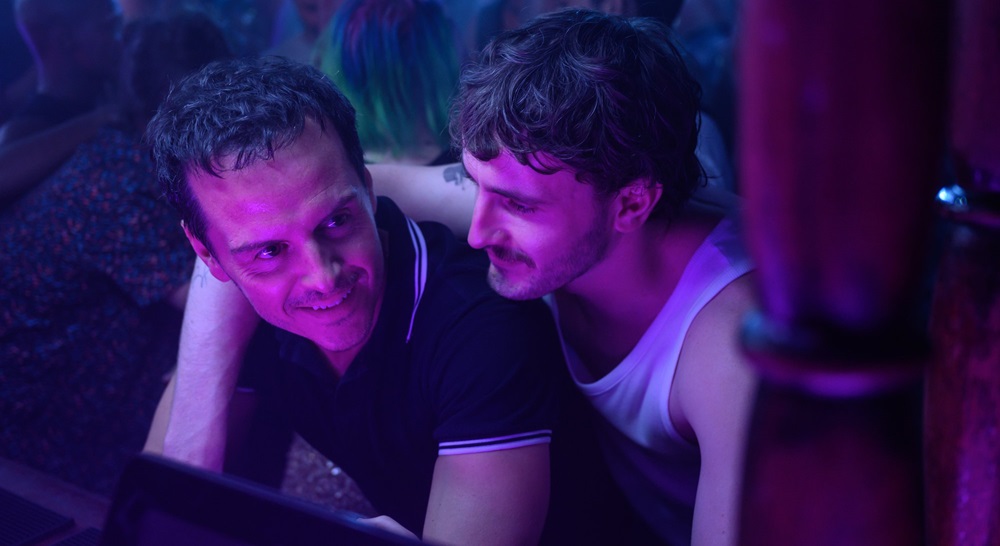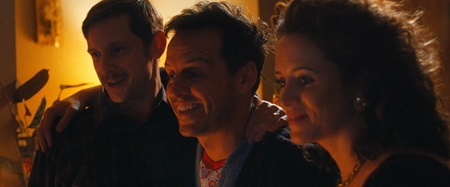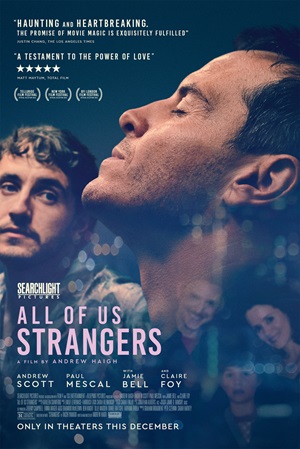
All of Us Strangers (2023)
by Sara Michelle Fetters - December 22nd, 2023 - Film Festivals Four-Star Corner Movie Reviews
a Seattle Queer Film Festival review
All of Us Strangers is an Eye-Opening Journey into the Emotional Unknown
“What if?” is a staple of life. What if I took this path instead of the other? What if I learned to be more financially responsible as a youngster? What if I paid more attention in school, learned another language, or challenged myself to do things outside of what I thought was in my comfort zone? How would my life have changed? What sort of person would I be? Or would everything work out similar to what they are now?
Common questions that everyone, everywhere have certainly had at some point during their lifetimes and countless types of entertainment throughout history have played with in all their various forms. Leave it to acclaimed filmmaker Andrew Haigh (45 Years, Weekend) to tackle them with such bracingly honest elasticity and internalized naturalism. All of Us Strangers is maybe 2023’s best film.
Loosely adapted from Japanese author Taichi Yamada’s 1987 novel Strangers, Haigh’s take brings things to a modern London and focuses on a struggling middle-aged writer, Adam (Andrew Scott), living alone in a nearly empty high-rise somewhere in the middle of the city. After a chance encounter with a mysterious neighbor, Harry (Paul Mescal), things take an unforeseen turn. Not only does Adam enter into a passionately torrid affair with the younger man, but he is also drawn back to the small suburban town of his youth to revisit his childhood home.
What’s strange about that? Adam’s parents (Jamie Bell, Claire Foy), killed in a tragic car accident decades prior, are there to welcome him. Now he is the same age they were when they passed, and all three have several questions they’re eager to learn the answers to. Past and present collide, as do hope and heartbreak. Long-buried secrets come out into the open. Adam reveals truths about himself to his mother and father he was never able to as a child but always longed to have the opportunity to speak with them about. And yet, he’s still somewhat terrified as to what their reaction to his coming out as Gay to them might be.
This is not a simple tale of romance juxtaposed with a supernatural “coming out” melodrama. Far from it. Haigh is a cinematic poet, and he intertwines Adam and Harry’s affair into the writer’s interactions with his parents with an otherworldly dexterity that allows each side of the narrative to be permanently knotted with the other. Each footstep Adam takes makes a permanent imprint upon the proceedings, and while these personal connections are ephemeral, maybe even nonexistent, the effect they have to wound, redeem, soothe, and even inspire is beyond imagining.
I won’t try to sugarcoat things: All of Us Strangers demolished me. I couldn’t help but think of my relationship with my parents — thankfully still with me and an important part of my life — as I watched the film play out to its shattering conclusion. I had so many opportunities to reveal who I was and what I wanted when I was young, and each time I went for the lie instead. I could have intestinal surgery at 16, born from an ulcer so severe it was literally eating me away, and still not say a word about all I was questioning about myself. What I would not give to be able to play that moment out differently, the consequences of doing so be damned.
Gay, Straight, Trans, Bi, none of that matters. There is a universality to Haigh’s presentation that breaks through questions of race, gender, and sexuality. My Trans identity may be a vital aspect of who I am, but it is not the only thing I allow to define me. Each person is their own distinctive vessel, and Haigh instinctively uses this detail to his storytelling advantage. Identity runs deeper than any one element, and each expedition through life has its own obstacles that need to be overcome. Adam is us, and we are Adam, and whether or not he finds romantic fulfillment with Harry or if he is finally able to be his true self with his parents, that’s all secondary to him being able to understand, accept, and eventually forgive the one person he’s never been able to do so for far too long — himself.
Scott gives the performance of a lifetime. He taps into emotional crevices that had me shaking. He slides through the proceedings with a slithery rigidity that shouldn’t be possible. One moment his body is as unyielding as a mannequin, barely movable and almost robotic. At others, it is as if every bone in Scott’s body has been removed, the man twisting and crumbling as if he were a human Slinky. Through it all the actor’s eyes pierced right through me, a mixture of euphoria, sadness, revelation, shock, and most of all love showcased within them with beauteous specificity.
The rest of the ensemble is equally outstanding. Bell and especially Foy are devastatingly magnificent. They each share scenes with Scott that held me spellbound, especially whenever their characters have to speak about the complicated and nuanced feelings they’re dealing with regarding the pain their son had to have felt not being able to reveal his truth when they were alive. Their disappointment is with themselves, not with Adam, and the way Bell and Foy navigate through this internalized minefield is remarkable.
Haigh has never left anything to chance in any of his pictures as far as the technical aspects are concerned, and that is unquestionably the case here, too. Cinematographer Jamie Ramsay (See How They Run) paints an expressionistic portrait of darkness and light, utilizing a bevy of primary colors to augment what is happening inside Adam’s headspace at any given moment. The sound design is unsettlingly dynamic, enveloping the viewer with a primal ferocity that’s entirely unexpected. Frequent Haigh collaborator Jonathan Alberts (Lean on Pete) edits with deft fluidity.
But it’s those, “What ifs?” that make All of Us Strangers essential. It feeds upon dreams and nightmares alike, producing haunting, unavoidable truths about the human condition in the process. Haigh transported me into the deepest recesses of my soul, asking me to take stock of every choice I’ve made, good, bad, and in-between. Watching the film was an unforgettable experience unlike almost any other I’ve had in ages, and as difficult as that could be, I wouldn’t have had it any other way.
– Review reprinted courtesy of the SGN in Seattle
Film Rating: 4 (out of 4)







